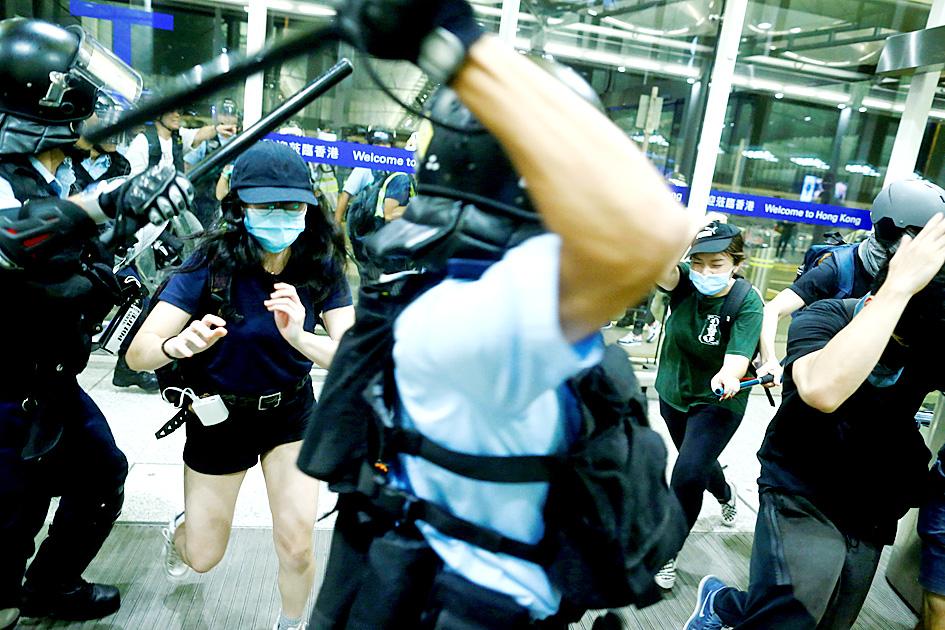Hong Kong residents last year renewed or applied for British National Overseas (BNO) passports in record numbers as anti-government protests erupted in the territory, the South China Morning Post reported.
The 154,218 BNO passports issued last year is an eightfold jump from the year earlier, the newspaper reported, citing British government data.
The authority also recorded 32,813 renewals by the end of June, the second-highest number since 2006, the Post said.

Photo: Reuters
The identity document is a product of the end of the British colonial era, made to recognize Hong Kong residents of the time as overseas British nationals, although it only gave holders the right to visit the country for as long as six months.
In July, the British government upgraded the status of BNO passport holders to offer them a path to British citizenship in response to the Chinese government’s introduction of a controversial National Security Law in Hong Kong.
The political unrest last year and the introduction in June of the security legislation have prompted many Hong Kong residents to plan an exit from the former British colony in search of more stability and freedom.
The UK has become an increasingly attractive destination with the easing of immigration policy toward BNO holders.
Realtors in London are already seeing a surge in interest from Hong Kongers, with inquiries up almost 80 percent this year for some agencies.
There are an estimated 350,000 BNO passport holders in Hong Kong and about 2.5 million who are eligible to apply.

RESPONSE: The transit sends a message that China’s alignment with other countries would not deter the West from defending freedom of navigation, an academic said Canadian frigate the Ville de Quebec and Australian guided-missile destroyer the Brisbane transited the Taiwan Strait yesterday morning, the first time the two nations have conducted a joint freedom of navigation operation. The Canadian and Australian militaries did not immediately respond to requests for comment. The Ministry of National Defense declined to confirm the passage, saying only that Taiwan’s armed forces had deployed surveillance and reconnaissance assets, along with warships and combat aircraft, to safeguard security across the Strait. The two vessels were observed transiting northward along the eastern side of the Taiwan Strait’s median line, with Japan being their most likely destination,

GLOBAL ISSUE: If China annexes Taiwan, ‘it will not stop its expansion there, as it only becomes stronger and has more force to expand further,’ the president said China’s military and diplomatic expansion is not a sole issue for Taiwan, but one that risks world peace, President William Lai (賴清德) said yesterday, adding that Taiwan would stand with the alliance of democratic countries to preserve peace through deterrence. Lai made the remark in an exclusive interview with the Chinese-language Liberty Times (sister paper of the Taipei Times). “China is strategically pushing forward to change the international order,” Lai said, adding that China established the Asia Infrastructure Investment Bank, launched the Belt and Road Initiative, and pushed for yuan internationalization, because it wants to replace the democratic rules-based international

ECONOMIC BOOST: Should the more than 23 million people eligible for the NT$10,000 handouts spend them the same way as in 2023, GDP could rise 0.5 percent, an official said Universal cash handouts of NT$10,000 (US$330) are to be disbursed late next month at the earliest — including to permanent residents and foreign residents married to Taiwanese — pending legislative approval, the Ministry of Finance said yesterday. The Executive Yuan yesterday approved the Special Act for Strengthening Economic, Social and National Security Resilience in Response to International Circumstances (因應國際情勢強化經濟社會及民生國安韌性特別條例). The NT$550 billion special budget includes NT$236 billion for the cash handouts, plus an additional NT$20 billion set aside as reserve funds, expected to be used to support industries. Handouts might begin one month after the bill is promulgated and would be completed within

The National Development Council (NDC) yesterday unveiled details of new regulations that ease restrictions on foreigners working or living in Taiwan, as part of a bid to attract skilled workers from abroad. The regulations, which could go into effect in the first quarter of next year, stem from amendments to the Act for the Recruitment and Employment of Foreign Professionals (外國專業人才延攬及僱用法) passed by lawmakers on Aug. 29. Students categorized as “overseas compatriots” would be allowed to stay and work in Taiwan in the two years after their graduation without obtaining additional permits, doing away with the evaluation process that is currently required,